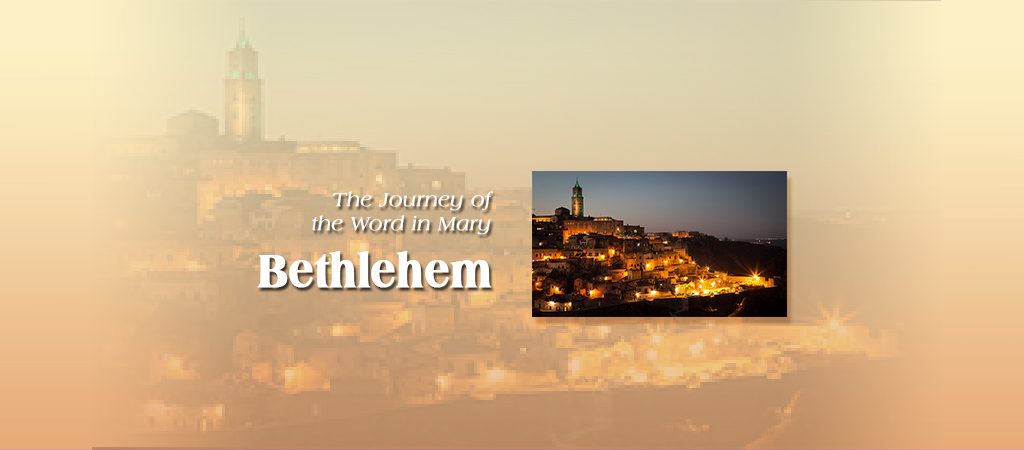After stopping in Ain Karem, the Word of God moves on to Bethlehem. The Old Testament mentions two places that bear this name.
One is in northern Palestine–in Galilee, to be precise, not far from Nazareth. Sprawling over a wooded hill, it is one of the 12 towns assigned by Joshua to the tribe of Zebulun (cf. Jos. 19:15), but we know nothing else about it.
The other Bethlehem, remembered as the “City of David,” is located in Judea, southern Palestine, just a few miles from Jerusalem. It stands about 775 meters above sea level and covers two hills of the Judean mountain range. Its rolling, terraced slopes are covered with vineyards, as well as fig, almond, pomegranate and olive trees. In ancient times, it was inhabited by the Canaanites, who called it Beit Lachama (House of Lachama) after a pagan divinity whose name means “God of war,” but the phrase can also be translated as “God of nourishment.” Today the Arabs call Bethlehem Beit-Lahm, “House of Flesh,” because of the numerous animal herds raised there. In the Hebrew Bible, the Canaanite name became Bêit-Leḥem, that is, House of Bread. But tradition also preserves the term “House of War,” most probably an echo of the history of the zone, where war was endemic and one had to go to battle to obtain bread. To understand the meaning of all this, let us try to put together the three words handed down to us by the life and history of the Bethlehemites: “God, flesh, bread.” These words can help make us receptive to the Mystery that became Light in this locality: “The Word, who was God, became flesh and then bread that is broken to satisfy the hunger of every person” (cf. Jn. 1; Mt. 4; Lk. 24).
Pilgrims of truth discover that Bethlehem is, in a certain sense, a “map” that discloses the exact location of an unknown mine, a hidden treasure, a secret of immense value. In Bethlehem, the treasure for everyone is Jesus, whom we meet through Mary. In her, God visits his people to end the war for bread: “One does not live by bread alone, but by every word that comes forth from the mouth of God” (Mt. 4:4). To “live by every word that comes forth from the mouth of God” means to take concrete steps to enter the desert of our heart and mind, where the essence of our being reigns in silence.
What is silence? It is a “burning bush”–a place where we meet God: “Be still before the Lord and wait patiently for him” (Ps. 37:7). In Hebrew, “to remain in silence” or “to dwell in silence” is translated by the verb dāmam, which describes the fundamental attitude we must adopt in God’s presence. This Semitic word is replete with significance. It means to refrain from speaking, to remain still, to be soundless, to be quiet and calm, to stop and rest, to listen, to remain tranquil, to surrender oneself gently. In silence, it becomes possible to listen and understand with greater clarity, allowing both parties (Other/other) to express themselves in a mutual self-revelation that is ever more human and divine. The light of silence helps us to reconnect the splintered pieces of our life in a therapeutic way. It also helps us discover the golden thread linking together different events that at first glance might seem isolated, without continuity or meaningless.
Mary remained before God in silence and Dietrich Bonhoeffer says that it was a silence concentrated on listening. Only silence opens a heart to the creative Word that “calls into being what does not exist” (Rm. 4:17). Without silence, words and the Word lose their content, life-giving lymph and power. Mary knew this and consequently chose to remain in contemplative silence so as to hear the Word in the words addressed to her, so as to grasp the presence of God in her daily life. Mary listened to the words of the angel in Nazareth and to the prophetic greeting of Elizabeth in Ain Karem. She listened to the account of the shepherds in Bethlehem, to the prophecy of Simeon, to the praise of the elderly Anna and to the mysterious words of her 12-year-old son in Jerusalem. She listened to the “hour” of her Son in Cana and to his total self-offering in love on Calvary. And on Holy Saturday, the Virgin of silence kept the lamp of the Word lit–the Word that illuminated her steps and proclaimed the light of Easter.
And what of you, Bethlehem, small and humble City of Bread? In you the Word continues to recount the eternal love of God and his ever-new encounters with humanity.
Bethlehem, the place of God’s choices, big and small, to you we sing our hymn of praise today:
House of Ephrath, holy city, glory of the prophets,
prepare the house in which our God will be born.
Rejoice, Bethlehem, queen of the cities of Judah,
because from you will come the Shepherd who will bring us joy.
Prepare yourself, Bethlehem: the Virgin will give birth to the One who,
before the dawn of time, shone in the breast of the Father.
(From the Greek Byzantine Liturgy)

